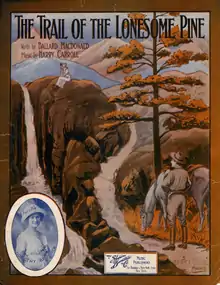The Trail of the Lonesome Pine (song)
"The Trail of the Lonesome Pine" is a popular song published in 1913, with lyrics by Ballard MacDonald and music by Harry Carroll. Inspired by John Fox Jr.'s 1908 novel of the same title, the song expresses the singer's love for his girl, June, who lives in the Blue Ridge Mountains of Virginia. The chorus is:[1]
- In the Blue Ridge Mountains of Virginia,
- On the trail of the lonesome pine—
- In the pale moonshine our hearts entwine,
- Where she carved her name and I carved mine;
- Oh, June, like the mountains I'm blue—
- Like the pine I am lonesome for you,
- In the Blue Ridge Mountains of Virginia,
- On the trail of the lonesome pine.
| "The Trail of the Lonesome Pine" | |
|---|---|
 Cover, sheet music, 1913 | |
| Song | |
| Language | English |
| Published | 1913 |
| Songwriter(s) | Composer: Harry Carroll Lyricist: Ballard MacDonald |
It appears to have been first recorded in New York on 28 March 1913 by the Spanish-American tenor Manuel Romain and released in June of that year on issue number 1743 of the Edison Blue Amberol Record label.[2]
The song was featured in Laurel and Hardy's 1937 film Way Out West. It was performed by Laurel and Hardy[3] with The Avalon Boys and featured a section sung in deep bass by Chill Wills, lip-synced by Stan Laurel in the film,[4] with the last two lines in falsetto (sung by Rosina Lawrence) after Ollie hit Stan on the head with a mallet.[5] This stage routine was performed by actors Steve Coogan and John C. Reilly as part of the 2019 biographical film Stan & Ollie. In 1975, at a time when Laurel and Hardy films were popular on British television, the UK branch of United Artists Records produced an album of dialogue and songs, Laurel & Hardy – The Golden Age Of Hollywood Comedy, that included "The Trail of the Lonesome Pine". Released as a single, the song reached No. 2 in the UK Singles Chart, thanks largely to being championed by disc jockey John Peel on his Radio 1 evening show.[4] The song was also recorded by Vivian Stanshall and (as "Blue Ridge Mountains of Virginia") by Tokyo Blade.
The song is featured in the stage play The Trail Of The Lonesome Pine, and is played during the opening credits of the 1936 film adaptation.
The song was the favorite song of Gertrude Stein.[6]
The song melody and chorus also have been used for an American square dance in the "singing square" style, where the dance caller's instructions are fitted to the melody and the dancers sometimes sing along on the chorus as they return to place at the end of each repetition of the group dance figure. [7]
References
- MacDonald, "The Trail of the Lonesome Pine" (Sheet music).
- "Manuel Romain – The Trail Of Lonesome Pine". Discogs. Retrieved 22 January 2018.
- Glancey, Jonathan (2011-11-28). "My favourite film: Way Out West". The Guardian. Retrieved 8 June 2019.
- Warner, Alan. "Two movie clowns who sang about 'The Blue Ridge Mountains Of Virginia'!". Wizwas.com. Retrieved 21 April 2016.
- Gehring, Wes D. (2007). Film Clowns of the Depression: Twelve Defining Comic Performances. MacFarland. pp. 157–8. ISBN 978-0786483525. Retrieved 2 May 2018.
- Wells, Amy (2017). "Modernist Shepherdess: Gertrude Stein's Pastoral Sounds". E-rea - Revue électronique d'études sur le monde anglophone. 14 (2). doi:10.4000/erea.5692.
- Don and Marie Armstrong, “Trail of the Lonesome Pine - Don & Marie Armstrong,” Square Dance History Project, accessed November 24, 2020, https://squaredancehistory.org/items/show/835.
Bibliography
- MacDonald, Ballard (w.); Carroll, Harry (m.). "The Trail of the Lonesome Pine" (Sheet music). New York: Shapiro, Bernstein & Co., Inc. (1913).
External links
- "The Trail of the Lonesome Pine", Manuel Romain (Edison Blue Amberol 1743, 1913)—Cylinder Preservation and Digitization Project.
- Transcription of Laurel & Hardy version